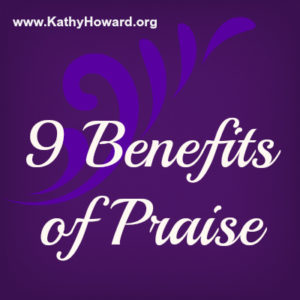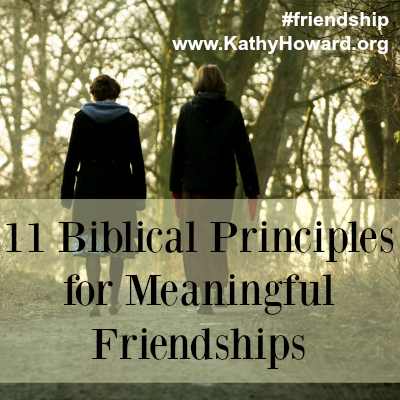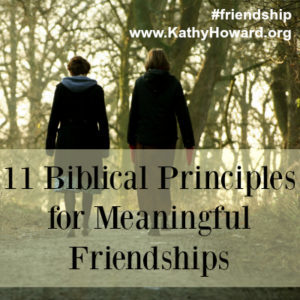Kathy Howard's Blog: Unshakeable Faith for Life, page 35
October 2, 2017
Diversity and Unity – God’s Heart for the Church
I saw a video yesterday that perfectly illustrates God’s design for the church – diversity within unity. This commercial for Android features two grand pianos. Both have 88 keys. One has the full range of notes. The other has 88 keys all tuned to middle C.
I’m going to admit it right up front. I heard the illustration in church yesterday. I did not come up with it, but I did ask the pastor if I could borrow his idea for today’s blog. Check out the short video now:
The music from the piano on the left sounds like the composer intended. Full, rich, a harmony of sound blending together into something greater than the sum of the individual notes.
The music from the piano on the right is monotone. Flat and lifeless.
God designed the church to be like the piano on the left. Eighty-eight keys each playing a different note, but working together in perfect harmony:
Each with a different gift (Romans 12:4).
Each given by God for a specific purpose (Romans 12:7).
All of us working together to serve the same Lord (Romans 12:5).
All working to build up the Church and share Jesus (Ephesians 4:12).
Different gifts, different tasks, but the same goal. One heart, one mind, one faith (Ephesians 4:4-6).
Together but not the same. Diverse, but unified.
Maybe if the Church plays loud enough the world will hear.
The post Diversity and Unity – God’s Heart for the Church appeared first on Kathy Howard.
September 28, 2017
9 Benefits of Praise
 One of my favorite worship songs is “Ever Be.” The lyrics, written by Kalley Heiligenthal, reflect David’s commitment to continual praise more than three millennia ago:
One of my favorite worship songs is “Ever Be.” The lyrics, written by Kalley Heiligenthal, reflect David’s commitment to continual praise more than three millennia ago:
I will extol the Lord at all times; his praise will always be on my lips. I will glory in the Lord; let the afflicted hear and rejoice. Glorify the Lord with me; let us exalt his name together. Psalm 34:1-3
God not only commands us to praise Him, He made us for that very purpose. We were created to worship the Creator. God made us for Himself (Colossians 3:16). He formed us for His glory (Isaiah 43:7). Our eternal purpose is to glorify and worship the Creator in relationship with Him. God hard-wired us to praise Him.
The psalmist David declared he would praise the LORD at all times, whether those times were good or bad. He cultivated a constant attitude of praise. David also urged the afflicted, the poor, the needy to join him in praising God. To rejoice in the Lord together.
What is “Praise?”
Praise is humble adoration of our Almighty God. It recognizes God’s exalted position and divine qualities. Praise voices sincere and deep gratitude for who God is and what He has done. As we praise Him, we submit ourselves to the One who is worthy and express devotion for the One whose love is unfailing.
Benefits of Praise
God deserves our #praise. But praise is also good for us. 9 Benefits
Click To Tweet
David’s call to praise is also for us today. Praise glorifies God, but it’s also good for us. (See Psalm 34:1-8).
Praise refocuses our minds on God and connects our hearts with His.
Praise fosters awareness of God’s presence with us.
Praise push the worries of this life into the background.
Praise reminds us of who God is and what He has done.
Praise recalls God’s past provision, thus strengthening our hope in His future deliverance.
Praise voices our dependence on God, relieving our fears.
Praise helps develop an eternal perspective, paving the way for God’s peace.
Praise opens our hearts to receive God’s joy.
Praise fulfills the purpose for which we were created, bringing fulfillment.
As God’s people, we are obligated to praise Him. But this obligation is not a burden. Instead, praise ushers us into the presence of our Burden Bearer. No one who rejoices in God will ever be disappointed. He hears our praise. He is our Deliverer and our Savior.
When was the last time you purposefully praised God? God longs to bless you through regular times of worship, both individually and with other believers. Like David, will you commit to praise God in both good times and bad?
The post 9 Benefits of Praise appeared first on Kathy Howard.
September 25, 2017
Following Jesus is either the BEST Decision or the WORST


 Yesterday, while visiting another church in our new area, one of the ministers said something that bothered me the rest of the service and into lunch. The children’s minister introduced a ten-year-old girl who had recently decided to follow Jesus. Right before he baptized her he said, “It’s one of the best decisions she will make in her life.”
Yesterday, while visiting another church in our new area, one of the ministers said something that bothered me the rest of the service and into lunch. The children’s minister introduced a ten-year-old girl who had recently decided to follow Jesus. Right before he baptized her he said, “It’s one of the best decisions she will make in her life.”
As soon as we got in the car, we began our after-church, church search routine. We shared our thoughts about the church, the service, and whether we think this might be the church God has for us.
“I was really bothered by the minister’s statement about that girl’s decision to give her life to Jesus,” I said.
“Yeah. That struck me too.”
“It’s not the first time I’ve heard a Christian say that. He probably didn’t even realize what he said. But it puts a decision to follow Jesus right up there with who to marry, what career path to follow, and how to invest your money.”
Maybe you think I’m making a big deal out of nothing. Getting on a soapbox over a slip of the tongue. But I don’t think so.
There are other vitally important decisions in our lives, ones that impact our health, relationships, and livelihood. There are even decisions with eternal consequences like whether to tell others about the salvation found only in Jesus or to keep it to ourselves.
Only one #decision determines your #eternal destiny
Click To Tweet
But the decision to follow Jesus – or not follow Jesus – is the only decision a person can ever make that determines her or his eternal destiny.
If there is life after death… If we need a Savior because of our sin… If trusting in the death and resurrection of Jesus is the only way to be made right with a holy God… Then choosing Jesus is the BEST decision you’ll ever make.
But if this life is all there is… Or if your soul gets absorbed into the universal cosmos (or some other silly nonsense)… Or if you can choose your own path to God… Then choosing Jesus is the most ridiculous, time-wasting, WORST decision you’ll ever make.
#NoMiddleGround #Jesus is either the BEST or the WORST decision ever
Click To Tweet
Choosing to give your life to Jesus in exchange for the eternal life He offers is either the BEST decision you’ll ever make or it’s the worst decision you’ll ever make. Period.
Have you made the BEST decision in your life? If you want to know more about eternal life found only in Jesus, click here.
The post Following Jesus is either the BEST Decision or the WORST appeared first on Kathy Howard.
September 21, 2017
I am Clueless
Have you ever been wronged by someone who had no idea she had done anything? It may have been hurtful words or inconsiderate actions. But she was completely clueless. It’s happened to me. And I know without a doubt that I’ve done it to others as well.
I read a Psalm recently during my quiet time that I’ve read dozens of times. However, this time God showed me something I had not really noticed before.
Who can discern his errors? Forgive my hidden faults. Keep your servant also from willful sins; may they not rule over me. Then will I be blameless, innocent of great transgression. Ps 19:12-13
At first read, it’s easy to understand “hidden faults” as those things we do we don’t want others to know about. The things we do in the dark, hide from others. But the surrounding statements shed a bit of light. David realized that he was not capable of even recognizing all the ways he sinned against our high and lofty God.
Let’s read it again from the New Living Translation:
How can I know all the sins lurking in my heart? Cleanse me from these hidden faults. Keep me from deliberate sins! Don’t let them control me. Then I will be free of guilt and innocent of great sin. Psalm 19:12-13, NLT
Sometimes I sin against God and don’t even realize it. My sinful heart keeps me from being able to recognize the depth of my transgression against our holy God. I’m clueless. My sin nature blinds me to my own sin.
The psalmist, David, asked God to forgive him for the sin he was not even aware he had committed. Then he asked God to protect him from yielding to blatant temptation. David longed to be blameless – innocent in thought, attitude, and deed. And not in just the things that people would notice. David wanted to be innocent in the eyes of his holy God. Wow!
God has brought me back to these verses several times in the last week. Do you think He’s trying to tell me something? Every time, my prayer has been David’s prayer:
May the words of my mouth and the meditation of my heart be pleasing in your sight, O LORD, my Rock and my Redeemer. Ps 19:14
Are you brave enough to ask God to reveal your hidden faults?
The post I am Clueless appeared first on Kathy Howard.
September 18, 2017
5 Things to Do When You Feel Discouraged


 When was the last time you felt discouraged? Maybe it’s today. Perhaps you face difficult circumstances or everything just seems to be going wrong. You don’t have to give in to discouragement.
When was the last time you felt discouraged? Maybe it’s today. Perhaps you face difficult circumstances or everything just seems to be going wrong. You don’t have to give in to discouragement.
The Apostle Paul had plenty of reason to be discouraged. Daily, he endured hardship, danger, pain, suffering, and uncertainty. More than once he looked death in the face. Yet he claimed to not only be content and at peace in any and every circumstance, Paul even rejoiced!
No matter the concern or difficult situation, Paul was at peace. Whether fed or hungry, he was content. Whether in need or in plenty, he was satisfied. In every event and every season, Paul chose to rejoice. Seems impossible, doesn’t it? What was Paul’s secret?
Rejoice in the Lord always. I will say it again: Rejoice! Let your gentleness be evident to all. The Lord is near. Do not be anxious about anything, but in every situation, by prayer and petition, with thanksgiving, present your requests to God. And the peace of God, which transcends all understanding, will guard your hearts and your minds in Christ Jesus.
Finally, brothers and sisters, whatever is true, whatever is noble, whatever is right, whatever is pure, whatever is lovely, whatever is admirable—if anything is excellent or praiseworthy—think about such things. Whatever you have learned or received or heard from me, or seen in me—put it into practice. And the God of peace will be with you.
I rejoiced greatly in the Lord that at last you renewed your concern for me. Indeed, you were concerned, but you had no opportunity to show it. I am not saying this because I am in need, for I have learned to be content whatever the circumstances. I know what it is to be in need, and I know what it is to have plenty. I have learned the secret of being content in any and every situation, whether well fed or hungry, whether living in plenty or in want. I can do all this through him who gives me strength. Philippians 4:4-13
Paul purposefully developed an active trust and confident dependence on Christ’s provision and power. Paul took every small need, big need, and in-between need to God in prayer. Peace filled Paul because he chose to trust that God would provide. He did not allow his mind to dwell on the “what ifs.”
Choose to #trust that #GodWillProvide
Click To Tweet
Paul experienced contentment in every difficult circumstance or physical need by relying on the strengthening power of Christ working within him. He found total sufficiency in trusting Jesus. And Paul could rejoice because he depended on God’s gracious provision.
#Jesus is far greater than our need
Click To Tweet
We can also experience peace, contentment, and joy when we follow Paul’s example. Here are a few practical tips to get us started:
Take every concern and need to God in prayer.
Choose to trust Him with the answer.
Discipline our thoughts. Focus on God’s provision and not the “what ifs.”
Ask Jesus to strengthen us in times of discontentment. Then rely on His strength.
Choose joy over discouragement.
Bury these marvelous truths in your heart, then share them with others. Jesus is far greater than our need. His power mightily overshadows our discouragement.
What one thing discourages you the most today? What truth from God’s Word today speaks encouragement to you?
The post 5 Things to Do When You Feel Discouraged appeared first on Kathy Howard.
September 14, 2017
Are You “Blessed?”
Today’s devotional thought was written by Kimberly Texidor, minister, Bible teacher, and leader of the Facebook group “Soul Tired: A Walk 90-Day Walk through the Psalms for the Weary Traveler.” (It’s not too late to join in!) This devotional is based on Psalm 1:1-3.

We just met “Harvey.” My family and I live and minister in the Houston area where we hurricane Harvey recently left devastating flooding in its wake. As the community mobilized to help with the cleanup process, there was an urgent need for what they call “mudding out” homes. It is as gross, smelly, and difficult as it sounds, but the work is vital to the survival of the property.
As I scrolled through social media one afternoon, I came across a photo of a family’s soggy, ruined possessions tossed onto the street along with sheetrock, carpet, insulation, and a lifetime of memories. On the top of the pile lay a cutout sign that probably once adorned their mantle. It simply read #Blessed.
What does it really mean to have a #blessed life?
Click To Tweet
I have to admit, I’m often perplexed by this “blessed” movement. So often the hash tag comes alongside photos of smiling families, cute children, new cars, or luxury vacations. What does it really mean to have a “blessed” life? What am I actually telling someone at the grocery store or coffee shop when I tell him to have a “blessed” day?
What does it mean to be “blessed?”
For the Psalmist, this “blessed” life was more than a collection of stuff or a season when everything goes according to plan. In the original language, this word is literally translated “happy”. This kind of blessed life is a deep-running happiness that endures outside of circumstances, seasons, floods, or feelings.
Blessed is the one who does not walk in step with the wicked or stand in the way that sinners take or sit in the company of mockers, but whose delight is in the law of the Lord, and who meditates on his law day and night. That person is like a tree planted by streams of water, which yields its fruit in season and whose leaf does not wither— whatever they do prospers. Psalm 1:1-3, NIV
What can we learn from Psalm 1 about this “happy” life? First, the text says this abiding happiness comes from a disassociation with the wicked and an attachment to God and His Word. (vv1-3). This happy person recognizes the sneaky nature of evil that would cause a follower of God to first walk, then stand, then take up a seat and sit with influences that bring harm to our souls.
Second, this blessed person is consciously and consistently spending time in and meditating on God’s Word. In a changing, uncertain, storm-ravaged life, the blessed person chooses to focus on God’s eternal promises rather than temporary circumstances. As Isaiah 40:8 says, “The grass withers and the flowers fall, but the word of our God endures forever.”
What do you need for a #blessed life?
Click To Tweet
How Can I have a Blessed Life?
The truth is, if I base my happiness on the people, influences, or stuff in my life, where will I be if it all blows away? If I build a life on unhealthy relationships and decisions, will I feel happy when I see my own face in the mirror? To use the illustration of Jesus, if I’m building an entire life on a castle made of sand, who will I be when it falls? (Matt. 7:24-27)
But we can build a different life, a blessed life, even a happy life. We can build a life based on God’s Word and on living connected to Him. This person, according to Psalm 1, will be a stable, steady, well-fed, blessed person, through all the storms and seasons of life.
Apply these Blessed Truths:
Would I describe my life today as “blessed”? Do I base my feelings of blessedness on people, things, circumstances, or something else?
Are there unhealthy people or influences in my life that are causing me to walk, stand, or pull up a seat and sit in places where a child of God doesn’t belong?
What commitment do I need to make in regards to meditating on God’s Word?
It’s not too late to join the “Soul Tired” community! There you will find the 90-day reading plan for the Psalms, daily devotionals and lots of discussion in a loving community!
The post Are You “Blessed?” appeared first on Kathy Howard.
September 11, 2017
How Humility In Your Time of Need Changes Everything


A big thank you to today’s guest Tricia Goyer! If you want to hear more about how Tricia walks out her faith in every day life – and how you can too! – check out her soon-to-be-released book “Walk It Out.“
 The other day I was cooking dinner when my six-year-old son rushed into the kitchen.
The other day I was cooking dinner when my six-year-old son rushed into the kitchen.
Beads of sweat slid down his red face. “I’m so hot. You never get me anything to drink.”
I stirred my spaghetti sauce with one hand as I turned to him. “Excuse me?”
His voice rose in a full, high-pitched whine. “You never give me anything to drink!” He waved his hands and dropped to the floor.
I took in a breath and then released it, telling myself to keep my voice steady, calm. “I’d be happy to get you a drink. I just need you to ask.”
He kicked his foot against the floor. “But I want a drink now!”
“I know you do.” I peered down at him. “And as soon as you ask the right way I’m happy to get some some ice cold water.”
And then my son stood, smiled up at me and asked so sweetly for a drink of water … NOT!
Instead, he whined and fussed more. Finally, I asked him to leave the kitchen.
You know what? He never did ask. In fact, he didn’t get anything to drink until fifteen minutes later when we were sitting down to dinner. He was so bent on complaining and whining—in feeding his discontent—he didn’t want to release his control in order to ask me for help. I would have gladly given him the drink he requested if only he asked in the right away.
Feeding Our Discontent
I wish I could say this is just a little kid issue, but I’ve been there myself. During my teen years I lived in that storm of discontent. I complained when things didn’t go my way. I worried. I fretted. I fought.
I even took matters into my own hands when I found myself facing an unplanned pregnancy at age 15. My own fears and worries led me to a choice I now regret—I had an abortion.
It wasn’t until years later, at age 17 when I was pregnant again, that things took a turn for the better. It’s then I humbled myself and turned to God. By this point I realized the whining, complaining, and acting out wasn’t getting me what I wanted or needed.
At six months along, I wrapped my arms around my growing stomach and prayed, “Lord, if you can do anything with my life, please do.”
God showed up big time. He not only gave me Himself (which is the best!), He has also led me on a journey where radical, and wonderful things, have happened. This has included marrying a wonderful Christian man, having two more kids, starting a crisis pregnancy center, mentoring teen moms, adopting seven more children, and writing over 70 books!
#TriciaGoyer learned to #WalkItOut through #humility before God
Click To Tweet
It Starts with Humility
God didn’t just offer me a cup of cool water when I asked. He opened the floodgates of blessing. But it took me humbling myself and seeking Jesus to meet my needs.
This reminds me of a Scripture I was reading just this morning, “I called on your name, LORD, from the depths of the pit. You heard my plea: ‘Do not close your ears to my cry for relief.’ You came near when I called you, and you said, ‘Do not fear.’ You, Lord, took up my case; you redeemed my life,” Lamentations 5:55-58.
Mumbling, complaining and griping are easy, but they rob us of having our greatest needs met. Yet when we humble ourselves and turn to God, things will change for the better.
When we call to the Lord, He hears us. When we turn to Him, He comes. When we call to Him, He reminds us that He is present and we have no reason to fear. When we place our needs in His court, Jesus redeems our life.
It took a lot to humble me as a teen—two unplanned pregnancies in fact. Yet I’m thankful that I learned back then that when I turn to God He will meet my needs. He will meet them in more wonderful ways than I ever expected.
You can read more about how God can show up radically in your life in the book Walk It Out: The Radical Result of Living God’s Word One Step at a Time (http://amzn.to/2wi1Cwi). If you pre-order Walk It Out before October 1, you’ll also receive 30 Days of Prayer as You Walk It Out FREE! Details here: http://www.triciagoyer.com/walk-it-out/
The post How Humility In Your Time of Need Changes Everything appeared first on Kathy Howard.
September 7, 2017
11 Biblical Principles for Meaningful Friendships


 God created friendship. And He works through true, meaningful relationships to help us be all He intends. As we learned in Monday’s post, we need to first clear the hindrances to friendship. But what’s next?
God created friendship. And He works through true, meaningful relationships to help us be all He intends. As we learned in Monday’s post, we need to first clear the hindrances to friendship. But what’s next?
The following principles for making and keeping real friends come straight from Scripture. Use them as a guideline as you purposefully work to make good friends and be a good friend.
11 biblical principles for making meaningful friendships and being a good #friend
Click To Tweet
11 Biblical Principles for Making and Keeping Friendships
Take the initiative (Acts 18:1-4) – One of my closest, life-long friends picked me to be her friend before I was really even aware of her. Janet and her family were new to our city, so when they joined our church she wanted to make friends. She introduced herself to me and immediately began to pursue a friendship. Janet taught me to take the initiative. Yes, it can be risky, but the rewards can be great!
Practice forgiveness (Colossians 3:13) – True friends don’t hold grudges or remember offenses. Instead they are flexible and quick to forgive. Contemplating God’s forgiveness can help us when we struggle to forgive others.
Guard your tongue (Proverbs 16:28, Ephesians 4:29) – Loose lips ruin many friendships. Careless words hurt feelings. Gossip fosters division. Confidences broken destroy trust. Before we speak, let’s pause to consider whether our words will tear down or build up.
Be a “good” friend (Ephesians 4:2-3) – Christ-like character fosters deep, long-lasting friendships. Qualities like humility, gentleness, patience, and endurance create a solid foundation on which to build life-long friendships.
Extend hospitality (1 Peter 4:9, Proverbs 25:17) – Sometimes we are quick to accept hospitality, but a little slower to give it. Let’s make time to not only invite our friends to our homes, but to also make them feel welcome. On the flip side, Proverbs 25:17 warns us against taking advantage of our friend’s hospitality.
Stay close in hard times (Proverbs 17:17, Proverbs 27:10, Romans 12:10) – A true friend remains loyal when trouble comes. Even if other “friends” fall away they stay devoted and help in any way possible.
Nurture them (Ephesians 5:21, Philippians 2:3-4, Romans 12:10) – Friendships will wither without a continual outpouring of time, attention, and resources. Let’s show our friends we care about their needs and their interests with purposeful acts of kindness and generosity. Our friendships will flourish.
Listen to them (James 1:19) – It takes lots of practice to keep our mouths closed and really hear what others are saying. But this habit is well worth developing. When others feel “heard” they feel valued.
Sharpen them (Proverbs 27:6, Proverbs 27:17, Colossians 3:16, Hebrews 10:24) – The best kind of friend is not merely a “yes man.” Godly friends nudge others closer to Jesus.
Pray for them (Job 16:20-21) – Our friends need our purposeful prayer support. Not just casual, occasional prayers, but fervent intercession with God on their behalf.
Love them (John 13:34, John 15:3, 1 Corinthians 13:4-8, 1 John 4:7) – This is actually harder than we might think. God calls us to love our friends like Jesus loves us – not in mere words, but with intentional actions of love that may often cost us something.
Have you seen any principles in Scripture to add to this list? Feel free to comment!
The post 11 Biblical Principles for Meaningful Friendships appeared first on Kathy Howard.
September 4, 2017
3 Hindrances to Meaningful Friendships


 We moved in June and I am in the process of building new friendships. I’ve had lots of practice making friends over the years. Over the last 33 years, our family has moved seven times for my husband’s job. Each time I left friends behind. Each time we settled into a new neighborhood with new neighbors. Each time we joined a new church with a new church family.
We moved in June and I am in the process of building new friendships. I’ve had lots of practice making friends over the years. Over the last 33 years, our family has moved seven times for my husband’s job. Each time I left friends behind. Each time we settled into a new neighborhood with new neighbors. Each time we joined a new church with a new church family.
It didn’t take long to learn that if I wanted to enjoy meaningful, solid friendships I could not waste any time. I had to be intentional about making make friends and I had to be a friend worth having.
Sadly, today’s fast-paced, shallow culture hinders the kind of friendships God desires us to have. In Thursday’s post, we will look at biblical principles for building and keeping friendships, but today, let’s touch on a few things we’ll want to avoid.
#busyness #fear #socialmedia 3 hindrances to real #friendships
Click To Tweet
Three Hindrances to Meaningful Friendships:
Busyness – Does it seem you never have time to enjoy long conversations with the friends you have now? Do weeks go by without seeing your local friends face-to-face? Honestly, most of us make time to do what we really want to do. If you think you are just too busy to foster deep friendships, try keeping a time log for a week to see just where your time goes. Perhaps you’re serving in some areas where God has not called you. Or maybe you’re allowing too many activities for your children to dictate your life. Purposefully build some margin into your life. Your friendships are vital to your emotional and spiritual well-being.
Fear of transparency – Although we cannot “go deep” with all our friends, we do need a few with whom we can share anything. We need people who can hear our hearts and understand. And we need friends who will hold us accountable when we are out of line. Yet, too often we are afraid to allow other people to know our flaws. We want them to think we have it all together. But we desperately need friends who will challenge us to be all God wants us to be. Yes, it can be scary, but test the waters. Choose one personal thing to share with a select friend and see how it goes!
Breadth of acquaintances – In our social media world it’s easy to confuse quantity with depth. Thousands of shallow “friends” mask the lack of real, deep friendships. Let’s limit our time with our online friends and get out in the real world.
God created women to need other women. Meaningful friendships help us be all God intends for us to be. Let’s make friendship a priority! Come back Thursday to discover 11 biblical principles for solid friendships.
Do you feel you have enough true friends? If not, what do you feel is getting in the way?
The post 3 Hindrances to Meaningful Friendships appeared first on Kathy Howard.
August 31, 2017
Is God Still Good in Loss?


 For the last week, I’ve been glued to the news and “praying without ceasing.” Since we just moved to the Dallas area from Houston in June, the area and the people are near to our hearts. We have been worried about neighbors, friends, and church family. Some have suffered loss of property, while others’ homes have escaped the flood waters. Some may be thinking God is good. Others, not so much.
For the last week, I’ve been glued to the news and “praying without ceasing.” Since we just moved to the Dallas area from Houston in June, the area and the people are near to our hearts. We have been worried about neighbors, friends, and church family. Some have suffered loss of property, while others’ homes have escaped the flood waters. Some may be thinking God is good. Others, not so much.
Where is God in all of this? Has He been good to some but withheld His help from others? We are so quick to say “God is good” when things go the way we want. When we get the job. When the sick child is healed. When the water recedes. But do we still praise Him, do we still believe God is good when the flood waters rise?
Our #circumstances do not define the #goodnessofgod
Click To Tweet
The Bible teaches us that our circumstances do not dictate or define God’s goodness. God’s character dictates His goodness. God is good all the time. No matter the circumstances. God’s goodness does not depend on a dry house. A flooded home does not mean God has not been good to us. In fact, a flooded home could be an opportunity for God to demonstrate His power and grace in your life in a dramatic way.
God’s goodness does not depend on a dry house #HoustonFlood
Click To Tweet
Truths about the Goodness of God
So what? Let’s start with a correct understanding of God’s goodness. Here are a few truths from Scripture to help us:
God’s will for our lives is always good (Romans 12:2). Sometimes – in fact, often – His will includes trials and difficulty that He uses for our spiritual refinement.
In all things, in all circumstances, our good God is working for our good. “And we know that in all things God works for the good of those who love Him, who have been called according to His purpose” (Romans 8:28).
The assurance of God’s goodness enables us to “give thanks in all circumstances” (1 Thessalonians 5:18) and to declare in easy times and hard times, “God is good!”
God is Good Even if Our Circumstances Aren’t
#GodisGood even if our #circumstances aren’t
Click To Tweet
Whether our physical circumstances are easy or difficult, how should these truths impact our daily lives? Here are a few suggestions:
Remember that God is good all the time. Not just when things are going the way we think they should.
Thank Him for His goodness and provision in every life situation.
Be sensitive to those around you who are facing difficult and painful circumstances. Don’t flaunt your “better” circumstances.
Declare His goodness in every circumstance, particularly in the hard times. Watch for His provision.
Lean on His strength and grace in the midst of overwhelming circumstances. His power working in you will testify of His greatness to others.
Remember that He can work in your pain and loss to bring glory to Himself.
God is indeed good all the time. He sees your every need and He cares. Lean on Him in every circumstance – good or bad. If you are able, be God’s tool to help someone else.
If your circumstances are “bad” right now, how have you seen God working in the midst of them?
You may also be interested in:
For a visual to help you remember God’s truth, see “5 Truths to Stand on for Unshakeable Faith.”
Specific prayers for Texas Flooding.
The post Is God Still Good in Loss? appeared first on Kathy Howard.



